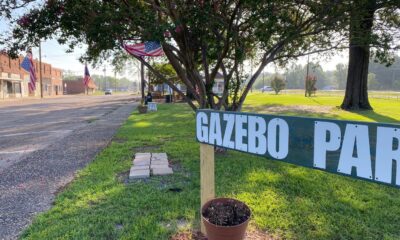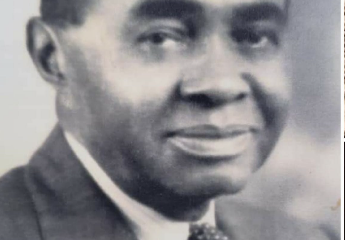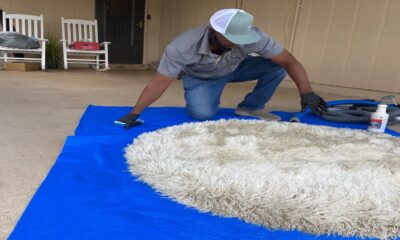Family
Family Reunions Require Planning, But Bring Great Connection
Some come for the craziness, some for the cuisine, some for the culture; but everyone who attends a family reunion gets a big dose of connection.
By Shera Dalin.
 Some come for the craziness, some for the cuisine, some for the culture; but everyone who attends a family reunion gets a big dose of connection.
Some come for the craziness, some for the cuisine, some for the culture; but everyone who attends a family reunion gets a big dose of connection.
With families spread across the nation these days, connecting to relatives as well as family roots is a vital activity, especially for African Americans, says Ione Dugger Vargus, professor emerita of social administration at Temple University and executive director of the Family Reunion Institute.
“The family reunion goes back to the migration right after slavery,” says Vargus, who studied family reunions for her book Finding the Rest of Me: African American Family Reunions.
Freed slaves began searching for their lost family members, often reuniting at picnics. But when Alex Haley’s book and movie Roots came out in the 1970s, the thirst for family reunions deepened, Vargus says. At the same time one-day picnics didn’t accommodate family members who had moved far away. The three- or four-day family reunion weekend was born.
“Families that are having them for three days or longer are the ones in which there were some real benefits and outcomes,” Vargus says.
Fifty, 500 or even 1,000 people all connected to the same family tree (most easily spotted by members wearing the same reunionT-shirt) gather in different cities where a branch of the family will organize and host the gathering. It’s a joyous affair marked by sightseeing at local attractions, a dinner and dance, a religious service, possibly a memorial service of those who have died, and many other activities.
The Beckley family reunion each year is always a good time and a great opportunity to catch up with relatives who haven’t seen each other since the last meeting, says Ruby Beckley of Shannon, Miss., and president of the Mississippi Beckley Club. Between 500 and 1,000 descendants of Sue Barr Beckley from Abbeville County, S.C., have been gathering in various cities since 1957.
“I like to see my family happy. I like to make them laugh, have fun and just feel the joy when I see the family is happy and not sad,” Ruby Beckley says. “We have a unity of love for each other.”
Reunions aren’t just all about fun and family. They also serve as a way to instill family values and connection, Vargus says.
“You lose your values if you don’t stay in touch,” Beckley says.
Two events that her family has planned for its 2011 reunion in Tupelo, Miss., is the unveiling of a memorial marker for Sue Barr Beckley near the family homestead in College Hill, Miss., and a slide show honoring the family members who are military veterans.
“That gets to be very important especially in terms of young people. You get a sense of your connection and belonging,” Vargus says. “There is something about family that is so important to us as African Americans.”
Some families use the reunion to promote certain values such as educational advancement by giving scholarships to entering college freshmen or perhaps anyone who is trying to better themselves by getting more education.
In other families, the host makes time for teaching the members about their forebears through plays or skits about the ancestors, telling stories that are family lore or having presentations about particular matriarchs or patriarchs.
In other cases, some of the outings will teach the family about their heritage such as a visit to a site such as Independence Hall in Philadelphia or returning for a homecoming to the ancestral homestead or town.
“We helped families see that what they were doing was building on their strengths and that there was even more they could do,” Vargus says.
While organizing the reunion is a tremendous amount of work, in the end it’s worth it, says Beckley family reunion club chairman Herron Beckley Jr. of St. Louis.
“If you want to know who your family members are and who you came from this is the way to do it,” he says.
By Shera Dalin, Author, Ghostwriter, Journalist.
Thinking About a Reunion?
Here are some Tips from the Family Reunion Institute:1. Eighteen months or a year before, form a planning committee of about six people. Include young people. Send a communication that a family reunion is being planned. Include a survey that asks for preferences regarding accommodations, dates and costs.
2. Think of who will come, where will it be held, when will it be held, what will you do and how long it will last.
3. Compile a list of relatives with names, addresses, phone numbers, and e-mail addresses. Arrange alphabetically
4. Designate responsibilities to different members of the host family or committee:
Hotel or site
Program development
Registration
Communications
Transportation
Food
Memorabilia or Souvenirs
Youth Development (Special activities for youth)
Fundraising
Family Heritage (How to present at reunion)5. Select location and facility. Consider transportation to and from the airport, meeting space needs, hotels, disability access and meals.
6. After site and date have been determined, communicate this information. Mention if there will be additional fees.
7. Figure out how you’re going to raise money to pay for up-front expenses.
8. Develop a program. Send registration forms and indicate final payment date.
9. Six to four weeks ahead send out another communication regarding final plans and agenda. If people haven’t paid registration fees, and made facility reservations, urge them to do so immediately.
10. One to two weeks before reunion, confirm all hotel and facility arrangements, payments, activities and other details. Verify transportation arrangements if people are flying in from out of town and the location is not easily accessible.
By Shera Dalin, Village Contributor

-

 Black History5 months ago
Black History5 months agoThe untold story of a Black woman who founded an Alabama hospital during Jim Crow
-

 Featured8 months ago
Featured8 months ago‘No Closure’ In Town Where Five Black Residents Were Either Murdered, Died Suspiciously Or Are Missing
-

 Black History9 months ago
Black History9 months agoBlack History Lost and Found: New Research Pieces Together the Life of Prominent Texas Surgeon and Activist
-

 Featured9 months ago
Featured9 months agoFounder of “The Folding Chair” Podcast Calls Montgomery’s Brawl ‘Karma’
-

 Featured8 months ago
Featured8 months agoThousands ‘Live Their Dream’ During National Black Business Month
-

 Featured10 months ago
Featured10 months agoJuneteenth And ‘246 Years Of Free Labor’ Are Key To Conversations About Reparations



